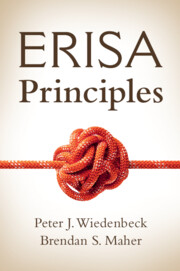Book contents
- ERISA Principles
- ERISA Principles
- Copyright page
- Contents
- Acknowledgments
- Table of Cases
- Table of Legislation
- Table of Rules and Regulations
- Part I General Considerations
- Part II Conduct Controls: Welfare and Pension Plans
- Part III Content Controls: Pension Plans
- 7 Accumulation
- 8 Distribution
- 9 Security
- Part IV Tax Controls: Qualified Retirement Savings
- Part V Health Plan Content Controls
- Appendix ERISA’s Legislative History
- Index
8 - Distribution
from Part III - Content Controls: Pension Plans
Published online by Cambridge University Press: 15 February 2024
- ERISA Principles
- ERISA Principles
- Copyright page
- Contents
- Acknowledgments
- Table of Cases
- Table of Legislation
- Table of Rules and Regulations
- Part I General Considerations
- Part II Conduct Controls: Welfare and Pension Plans
- Part III Content Controls: Pension Plans
- 7 Accumulation
- 8 Distribution
- 9 Security
- Part IV Tax Controls: Qualified Retirement Savings
- Part V Health Plan Content Controls
- Appendix ERISA’s Legislative History
- Index
Summary
ERISA permits distribution of pension benefits only to certain persons and at certain times. A vested participant does not normally have an immediate right to her accumulated saving, nor can she direct its payment to someone else. Pension plans are designed to provide workers with a secure source of retirement income, not to facilitate general purpose savings. Therefore, access to pension savings is restricted, either by the terms of the plan or by ERISA itself. ERISA’s rules governing pension plan distributions address three issues. First, the timing of distributions is restricted. Second, the anti-alienation rule generally limits the recipients of distributions to the participant and her beneficiaries, although a spouse, former spouse, or dependent child of the participant may enforce certain state domestic relations law claims against the pension by means of a qualified domestic relations order (QDRO). And third, the participant’s spouse is, in effect, designated primary beneficiary.
Keywords
- Type
- Chapter
- Information
- ERISA Principles , pp. 263 - 287Publisher: Cambridge University PressPrint publication year: 2024



